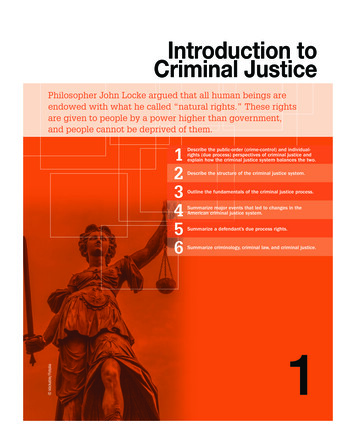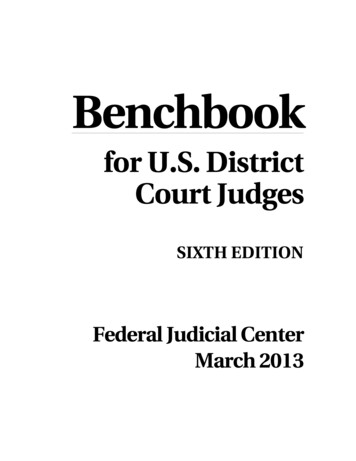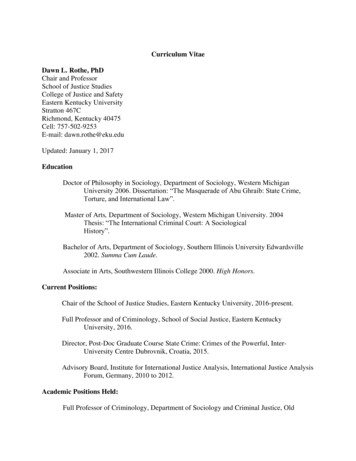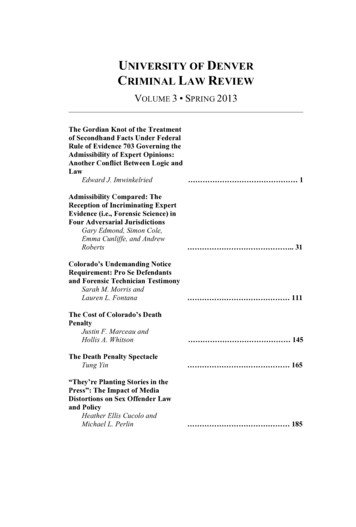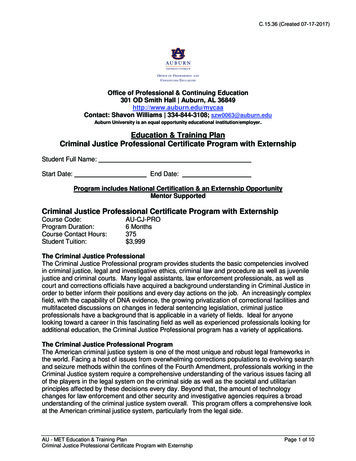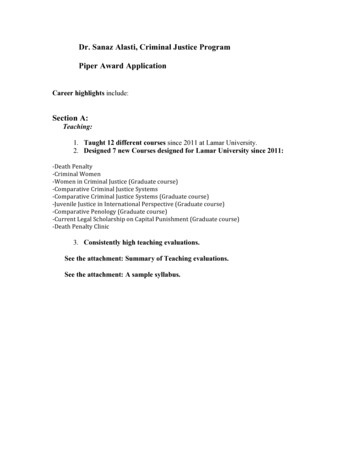
Transcription
ADVOCAGY FOR REINTEGRATION; UPCjATE II-;j,"L' "J'.Now using Advocacy, for Reintegration is a l:Hree-stepprocess;1) Look in the main volvune table of contentsfor the material you need.2) Check Update for more recent informationon this topic. (Cross-referenced by mainvolume page numbers in Update page margins.)3)Repeat step #2 in Update II.Besides using Update II to supplement Advocacy forReintegration, it may be a good idea to read through itnow to familiarize yourself with important changes inthe law. Pay particular attention to the Update IIAppendix, which discusses an opinion clarifying theimpact of the state law outlawing employment andlicensing discrimination on grounds of criminal record.JUL It 1980RE ilVEDSf HVI J4281977Update 2% - AUGIJ ,CRIMINALANOINFORMATIONCENTERUNivERisiTVoi WisconsinPMDISON, VVi cO, „.N 53706J5" !ii
Add after last paragraph:Wisconsin's Youthful Offender Act has been repealed. 3Add before paragraph at bottom of page;kfi't.2.In Counts v. U.S. Postal Service, 18 EPD 1[8788 (D.C.N.D.Fla., 1979), a Florida Federal District Court ruledthat a postal service regulation prohibiting individualswith a history of epilepsy from holding jobs involvingdriving, dangerous machinery, moving parts of heightsdoes not deny persons with a history of epilepsy equalprotection under the laws of the U.S. Constitution.The court considered the regulation justifiable be cause the purpose of the regulation, to prevent harmto the public and postal service workers, is in thebest interest of the public.7Add at bottom of page:(4)Action: Peace Corps, VISTA(608) 264-5277Madison9Add after "Federal Employment of The Handicapped";The manual "Advocacy for Reintegration" .was designedprimarily to cover topics that relate to persons who. suffer civil disabilities because of histories ofmental illness, alcoholism, drug abuse or criminalconviction. There are two reasons why courtdecisions and substantive changes in the statutorylaw on "the handicapped" will be included inUpdate II. First, there are numerous,theories andopinions as to who is "handicapped" or what is a"handicap", and therefore it is in the best,interest of the reader to be aware of some of themore widely accepted interpretations. Second, thereader, equipped with information about the waysthe courts are currently solving issues in thisarea, will be in a better position to anticipatehow a court will resolve new problems.16Footnote to last paragraph;.See, Update II Appendix.17-1-
Add at the end of second paragraph; .Section 16.05 of the Wisconsin Statutes has been 'renumbered. The new section is §230.07, Stats.Footnote to paragraph ending on top of page andUpdatematerial- pertinent thereto;1820See Update II Appendix.Footnote to "(2)" and Update I material pertinenttheretoT21See Update II Appendix.Footnote to top "partial" paragraph, second fullpar'agraph, and Update I material pertinent thereto;24See Update II Appendix.Add as first full paragraph before "Wis. State andLocal Licensing Restrictions";In addition to arguing that the denial or revocationof a license violates the Fair Employment Act, onecan argue that a licensing agency abused the dis cretion granted it by statute in denying or revokinga particular license. In one such case, theOptometry Examining Board revoked the license of anoptomestrist when he was Convicted of a felony(income tax evasion). The case was resolved in theWisconsin Supifeme Court in idinger v. OptometryExamining Board, 81 Wis.2d 292; 260 N.W.2d 270 ri979).The Court ruled that the Board had abused its discretion because the decision to deny the licensewas based solely on Reidinger's convicti6n-; the factsor circvimstances of his conviction were' hot con sidered. The Court implied that the factors alicensing agency might appropriately look at wouldinclude not only the nature and seriousness of thecrime, but its surrounding circumstances, includinghealth, family and financial problems of thelicensee.-2-24
r;' Footnote to second full paragraph and Update ImateriaX pertinent thereto; 25See Update II Appendix.Add as footnote to each "Occupation" andUpdate material pertinent thereto;See Update II Appendix.Add after second paragraph under "EmploymentDiscrimination";Add as second paragraph under "Wisconsin FairEmployment Act";';Several recent Wisconsin court decisions have importantimplications for making handicap discriminationclaims based upon conditions of alcoholism, drugabuse or mental illness. The Wisconsin Supreme Courtin Connecticut General Life Insurance Company v.Department of Industry Labor and Human Relations,86 Wis.2d 393; 273 N.W.2d 206 (1979), held that"voluntary drinking" is not a "handicap" withinthe meaning of the Wisconsin Fair Employment Act.In another case, a railroad switchman was firedbecause his eyesight did not meet company imposedstandards. The employer argued that there was nounlawful job bias, since the company-imposed eyestandard was related to the job. The court didnot accept this argument. The Dane County CircuitCourt stated that in the failure to prove a sub stantial relationship between the job and thecompany-imposed eyesight standard, the termina tion amounted to unlawful job bias under theWisconsin Fair Employment Act (Chicago andNorthwestern Transportation Company v. Wisconsin,DILHR (case #15.7-'101) , 17 EPD 8621 (197811:In Fischer v. Wisconsin, Department of Industry,Labor and Human Relations, Dane County C/C #154-381,"a high school teacher who was hired to teach"behind the wheel" driver's education, biolog-y,fish filleting, arc"hery and various other physicaleducation activities was fired after an eye diseasep caused him to go blind. The court ruled that ther ployer's failure to provide assistance to theIteacher that would enable him'to continue teaching.26thru424851
and that his subsequent firing thus amounted to unlawfuljob bias under the Wisconsin Fair Employment Act. TheCourt in Fischer came very close to saying that theemployer must take "affirmative action" to fosteremployment of the handicapped in stating, "An employerhas a duty to accommodate a handicapped employeeunless the accommodation would impose a burden onthe employer."Footnote to "Remedies Against Private EmploymentDiscrimination" and Update I material pertinentthereto:48thru50See Update II Appendix.Footnote to first paragraph under "Wisconsin FairEmployment Act" and Updatel material pertinentthereto:51See Update II Appendix.Add after "State Contractors -and EmploymentDiscFImination":The Wisconsin Statutes now require state contrac tors to include in their contracts with the statea clause guaranteeing non-discrimination andaffirmative action with respect to "handicaps,physical condition and developmental disability,"among other classes. §16.765, Stats. A strongerargument can be made under this than the pre vious provision that alcoholics, drug abusers andparticularly the mentally ill are covered.In addition, the staff at the Center anticipatesthe introduction of a bill before the Assemblythat would substitute "handicap" for "handicap,physical disability and developmental disability."If enacted, the amendment would define "handicap"as any physical or mental impairment which sub stantially limits one or more of a person s major 'life activities, a record of such an impairment,or being regarded by others as having such animpairment.52
The impact of this bill would be three-fold. First,the bill would reduce, if not eliminate, the con fusion which the numerous definitions of the term"handicap" have caused. Second, the definitionwould include persons with a history of mentalillness, drug abuse or alcoholism among the existingclass of people who aiire entitled to protection be cause of their handicapped status. The bill wouldaccomplish this by equating the Wisconsin defini tion of handicap with the federal definition.However, until this bill is passed this area of thelaw remains in a state of confusion. (See sectionin Update II on Federal Rehabilitation Abt).Add as second paragraph under "Wisconsin FairEmployment Act""!A proposed amendment to the Fair Employment Act, likelyto be introduced this legislative session, wouldprohibit pre-employment inquiries regarding handi caps or their treatment unless they concern theapplicant's present ability to perform specificfunctions of the particular job for which the em ployment application has been made. Pre-employmentmedical evaluation would not be prohibited, providedthat its purpose was to determine an applicant'sjob-related abilities, and that all applicants forthe job were evaluated on the same basis.Add after "Federal Rehabilitation Act";The pertinent sections in the Act provide some ofthe most effective tools (on the federal level) toadvocate the interest of people who qualify as"handicapped". Hence, a fundamental understandingof the Act will assist the advocate in the use ofthis tool. The following section is designed toanswer four questions.1)What does it mean?2)Who can use' it?
3)4)1.Who can it be used against?How can it be used?What it means.In Southeastern Community College v. Davis, (U.S.1979), the United States Supreme Court heldthat there is nothing in the language or the historyof §504 of the Act which limits the freedom of aneducational institution to require reasonablephysical qualifications for admission to its nursetraining program. An otherwise qualified person isone who is able to meet all of a program's require ments in spite of his or her handicap. While thisinterpretation is limited to the field of education,it may be followed in the employment area. Thebasic significance of the decision is that the U.S.Supreme Court does not interpret the federalgrantee's non-discrimination responsibilities toinclude taking affirmative action.2.Who can use it.In Davis v. Bucher, 451 F. Supp. 791 (D.C.E.D. Pa.,1978), a federal court clearly stated that people witha history of drug abuse are within the definition of"handicap." Hence, they have the right to sue underthe Act.In addition, the U.S. Supreme Court recently ruled thatthe definition of handicap "arguably includes certainformer drug abusers and certain current users ofmethadone." However, it is important to point outthat the value of the statement is diminished by thefact that the statement did not relate directly tothe issues that were before the court (New YorkTransit Authority v. Biazer, 438 U.S. 904 (1979)).3.Who can be sued.A nurse who was discharged from her position in anursing home due to progressive sight impairmentcould not maintain an administrative or court action-6-53
under the Rehabilitation Act of 1973 unless theprimary objective of the federal assistance whichthe employer received was to provide employment(Trageser v. Libbie Rehabilitation' Center, Inc.,590 F.2d 87; 18 Epd 8733 (1978)).In Counts V. U.S. Postal Service, 18 EPD 118788 (DCNDFla., 1979TT a suit filed by an epileptic employedby a federal agency was dismissed because the 1973Rehabilitation Act does not bar federal agenciesfrom discriminating against handicapped individuals,it only prohibits agencies who receive federalfunds from engaging in such bias.4.How it can be used.The Third Circuit Court of Appeals, in an unpub lished opinion, ruled that a person seeking a declara tion that a grantee violated the Rehabilitation Act,or an injunction to prevent future violations, couldseek such relief in a federal district court action.The opinion implied that where a termination offunding is sought, administrative remedies mustfirst be exhausted before going to court. The opinionleft open the question of whether damages could besought under §504 in a court action without havingfirst exhausted administrative remedies. NationalAssociation for the Advancement of Colored Peoplev. The Medical Center #78-1616 1X979).For federal rules regarding affirmative action obliga tions of contractors and subcontractors for handi capped workers, see "Federal Register", Vol. T57 No. 204, Friday, October 20, 1978, pp. 49276 et seq.,o 6 FR 741.Add after second paragraph;The revision to 45 CFR 84.3 (j) explains civil rightsresponsibilities of recipients of federal funds of fering vocational education programs. They derivefrom and provide guidance supplementary to Title VIof the Civil Rights Act of 1964 and the implementingdepartmental regulation (45 CFR Part 84). For more
inforination, see the Federal Register, Vol. 44, No. 56,Wednesday, March 21, 1979, or contact David Gejrard,Office of Standards, Policy and Research, Department ofHealth, Education and Welfare, Office for Civil Rights,330 Independence Avenue, S.W. Washington, D.C. 20201(202) 245-9177.See Counts v. U.S. Postal Service, above, p ;.See new form, next page.Add after page 61;TARGETED JOBS TAX CREDIT PROGRAMThe Tax Reform Act of 1978 created the Targeted JobsTax Credit Program, which encourages employment amongcertain hard-to-employ groups. A person who is amember of any of these groups makes any qualifyingcurrent or prospective employer eligible for sub stantial tax credits. The Tax Credit Program speci fically targets seven groups, including:—Economically disadvantaged ex-felons withinfive years of their conviction or release dates,—Handicapped persons receiving or completing voca tional rehabilitation,—Youth age 16 through 18 participating in coopera tive education programs,—Youth age 18 through 24 who are members of econ omically disadvantaged families,—Vietnam-era veterans under 35 who are economic ally disadvantaged,—Recipients of Supplemental Security Income, and—Persons who have received general assistance for30 or more days.(continued on page following next)-8-5657
E.O.C. Case No.SOCfAL SECURITY NUMBERE.R.D. Case No-MADISON EQUAL OPPORTUNITIES COMMISSIONSSI West Wilson Street, Madison, Wisconsin 53709E.E.O.C. Case No.'608/266-4910COMPLAINT OF DISCRIMINATIONCOMPLAINANT.— Telephone „RESPONDENT—.Teraph THIS COMPLAINT CONCERNS:IN REFERENCE TO:Q Cradit AgeQ ReligionQ Conviction RecordD Housing SexQ Arrast RecordD Sexual OriantationQ EmploymantQ RaceG Merltel StetusQ Physical AppearanceQ City FacilitiesQ ColorQ Source of Income National Origin/AncestryQ Student Political BeliefsQ Less Then Honorable DlschergtQ Public Accommodations HandicapEXPLAIN WHAT UNFAIR THING WAS DONE:PERSON WHO ALWAYS KNOWS WHERE YOU CAN BE REACHEDIf a State or Federal Aoancy has iurfsdictionovar your complaint, would you lika thii com plaint filed with tha appropriata State and/orNAMEFadaral Agancv?STREET ADDRESS VESTELEPHONENO.iinciuda Aree Code)CITY. STATE & ZIP CODE NOSTATE OF WISCONSINL.belp0 duly swforn on oath, depowt.a id seyithat (i)he Is tha complainant herein; that (s)he has read the foreflotng complaint and khoAt thecontents thereof; that the seme is true to his (her) own knowledoe except as to matters thereinstated on Information end belief; end that as such matters U)he believes the same to be true.Subscribed end sworn to before methisWHITE - E.O.CCANARY - ComplsmaniPINK — RespondentGOLDENROD - Referral Agencydey ofNotary Public. Stata of WisconsinMy Commission (is permanent) (expires)—
The idea behind the program is to encourage employ ment by giving a tax savings to businesses which hirefrom among these groups. The program is effectiveduring 1979 and 1980 (though it may be extended byCongress), with the credits for the first yearamounting to 1/2 the employee's wages up to 6000.00and for the second year amounting to 1/4 the employee'swages up to 6000.00.Here is a brief overview of how the program works;A job-seeker believing he or she may fall within oneof the targeted categories and so qualify a prospec tive employer for the tax credit should inquire at thelocal Job Service Office. If the Job Service deter mines that the job-seeker does, indeed, fall withinone of the categories, it will issue him or her a"voucher". The voucher is evidence to prospectiveemployers that the job-seeker would qualify the emplo yer for a tax credit. The voucher is effective for30 days from the initial voucher date; when this per iod expires, the job-seeker must obtain another evalu ation from Job Service.Once the employer decides to hire the tax credit-eli gible job-se.eker, the voucher and an application aresent to the Job Service, which certifies the employeras eligible to receive the tax credits on his or hernext year's taxes.The vouchering process may also be initiated by theemployer who believes he or she has employees or ap plicants who might fall within the targeted groups.There are technical rules as to eligibility of bothemployer and job-seeker. For further information,contact your local Job Service Office.Footnote to section on Pardons; see Appendix BAdd at bottom of page;STATEWIDE; Lawyer Hotline - 1-800-362-9616Lawyer Hotline is a referral service that is sponsored by the Wisconsin State Bar Association. Theprimary function of the Lawyer Hotline is to help-10-62-7586j
individuals identify their problems as legal or nonlegal. Once the problem has been identified/ theattorney will refer the person to the appropriateadministrative agency or to a legal referral serviceif an attorney is necessary.Add after Madison in place of Legal Services Center;Legal Action of Wisconsin31 S. Mills StreetMadison, Wisconsin 53715(608) 256-3304After Oshkosh, delete old address and add;Legal Aid of Northeast Wisconsin404 N. Main StreetOshkosh, Wisconsin 54901(414) 233-6521Lacrosse;Legal Aid of LaCrosse620 Main StreetLacrosse, Wisconsin(608) 784-1900Add at bottom of page;A federal circuit court reinstated the SSI benefits toa claimant who was addicted to drugs and alcoholwhere the benefits had previously been denied becausethe plaintiff did not stop drinking alcohol when thedoctors recommended it. The Circuit Judge saidthe inquiry should have focused on whether theclaimant was addicted to alcohol and as a con sequence ha[d] lost "voluntary ability to controlits use." Adams v. Weinberger, 548 F.2d 239(USCA 8, 1977).Add under "Housing";A bill that would amend §101.22, Stats, is expectedto be introduced into the legislature this session.The amendment wQuld delete "physical condition or-11-
developmental disability" and add "handicap in itsplace. The amendment, if enacted, would havesubstantial impact in the area of housing discrimina tion in that it would prohibit housing discrimina tion on grounds of any handicap, not just physicalor developmental disabilities. This change wouldcertainly protect the mentally ill and, since thedefinition of "handicap" would parallel that of theFederal Rehabilitation Act, it would arguablypx'otect drug abusers and alcoholics as well.100Add as last paragraph in section on Insurance GeneralStaff members of the Center are anticipating theintroduction of a bill that could affect the costand difficulty of obtaining insurance for handicapped persons. The proposed change would make itunlawful for an insurer to limit coverage, tocharge different rates or to refuse to insure anindividual solely because of handicap, except whenthe decision was based on proven data or actualexperience. Persons with histories of mental illness, drug abuse or alcoholism, would benefit,since the definition of "handicap" would parallelthat in the Federal Rehabilitation Act, whichembraces these conditions.107Add as footnote under "Life Insurance and HealthInsurance";For more detailed information in this area, seeHealth ar Life Insurance for Persons with aHistory of Mental Illness,. Alcoholism, DrugAbuse or" Criminal Record,- (Ai gust 1978.J „ a studyprepared by the Center for Public Representation.lu/-Add to second paragraph:Consumer reporting agencies are alsoreleasing "any.adverse item of information whichantedates, the report by more than seven Years.15 use §1681c(a)(6). Assumedly, this would in clude information regarding history of or treat ment for mental illness, alcoholism or drugabuse.-12-115
Add as footnote to third paragraph;The protections of Chapter 275, IjaVs of 1975 would beextended to all handicapped persons under a bill soonto be introduced in the legislature. The proposalwould define "handicap" in the same terms as theFederal Rehabilitation Act, and thus a strongargument could be made that the prohibition ofcredit discrimination on grounds of handicapapplies in cases of mental illness, alcoholismand drug abuse.115Insert in place of last paragraph;Wisconsin law regarding voting rights of the men tally ill has been substantially revised by 2 0Chapter 394, Laws of 1977. The law now providesthat any person is ineligible to vote who is noncompos mentis, insane or under guardianship. A personwho is under limited guardianship retains his or hereligibility to vote if the court ordering the guardian ship determines that he or she is competent to exercisethe right to vote. §6.03(1)(a). Stats. For the firsttime, the statutory law defines the phrases "insane"and "non compos mentis" as they are used in thestatutory and constitutional voting disability pro visions. The terms are defined as "the incapacity toknow or understand the nature and objective ofelective process." §6.03(4), Stats.The new law also provides for the first time a pro cedure whereby the right to vote can be denied ongrounds of mental illness. A simple allegation, thata person is insane or non compos mentis may in noevent lead to a denial of the right to vote (§6.03(3),Stats.); rather, the procedures set forth in Chapter880 of the statutes for adjudications of incompetencymust be followed. Under these procedures, anyelector may petition the county court for a deter mination that a person residing in the same muni cipality is insane or non compos mentis as definedabove. The finding of the court must be limited to whether the person is eligible or ineligible tovote in general or in a given election. No other-13-
consequences, including appointment of a guardian,may result from a determination under such apetition. Any determination reached under thisprocedure is reviewable as provided in Chapter 880.(Where the person has previously been found in competent, or where limited incompetence withouta specific finding of competence to vote has beendetermined, the person is ineligible to vote with out further proceedings specifically relating toeligibility to vote.) §§880.07(3), 880.33(9),Stats.Add before "Mental Condition"!;The following subsections, have been deleted from§346.63, Stats.:"A person who is a habitual user of dangerous ornarcotic drugs" and "a person who is subject toepilepsy and who does not hold a valid operator'slicense issue pursuant to s. 343.09."Substitute for "Consideration or Denial";Section 343.16(2)(b)(d), Stats., a recently enactedstatute, sets forth the process for appealingdriver's license denials and cancellations. Theclaimant must file a written appeal before the re viewing board within 10 days after notice of thedenial or cancellation. The claimant has theright to appear on his or her own behalf and to berepresented by counsel. The board, which iscomprised of representatives from the Departmentand two doctors, is required to make a record ofits recommendations and to give specific reasonsin the event that the denial or cancellation isupheld. If mental disability or disease is atissue, then one of the members of the reviewboard must have training in psychiatry.Add to first paragraph;Assembly Bill 619 died in committee. More limitedrestrictions prohibiting firearms ownership byformer felons are before the 1979 Legislature.(See Assembly Bill 77)-14-
Add as second paragraph;The Wisconsin Youthful Offender Act ha,g been repealed.Those convicted under it while it was in force shouldretain their right to carry firearms, notwithstandingthe law's repeal.132Add after third paragraph under "Placement":Iji the Matter of the Guardianship of Thomas K. ZanderV. County ofEau Claire, (1979), the Court ofAppeals construed the several requirements of theprotective placement statute and ruled that findingsshould be made on evidence presented at the hearingin the trial court as to whether the individual wasincapable of caring for himself or herself and asto other factors bearing on need for protectiveplacement. The court ruled that the trial court's"common sense" findings on these points wereinadequate.138Protective placement procedures under Chapter 55,Stats., are changed to require the sheriff or otherperson making placement to prepare a factual state ment describing the basis for the action. Suchstatement is filed with the placement facility,the court and the subject. The subject must alsobe informed of certain rights and must be givennotice of the preliminary hearing to determinecause for placement.Add after "Involuntary Committment";The Mental Health Act of Wisconsin has beenextensively revised. Some of the relevant changesinclude:1. The standard for involuntary emergency deten tion and commitment of alleged mentally ill, developmentally disabled and drug dependent persons ischanged. Under former law, in order to be detained,the subject must have exhibited conduct which con stituted a substantial risk of physical harm tothe individual or to others, based on specific andrecent acts, attempts or threats to act. In order-15-140
to be coininitted, a person must also have been a propersubject for treatment and must have been shown to havebeen dangerous because of the substantial risk (asrequired for detention) or because of a very sub stantial risk of physical impairment or injury tothe subject individual as manifested by evidencethat the person could not protect himself or herselfor be protected by others in the community and couldnot be placed under ch. 55, stats. Under the new law,a person may be detained or committed if the individual poses a serious threat to himself or herselforothers and this threat is evidenced by arecent overt act or threat. We threat may bethrough inability to care for oneself. As underthe former law, a person must also be a proper sub ject for treatment in order to be committed. Inaddition, the new law provides that if the subjecthas been institutionalized immediately prior tocommitment, the requirement of a recent overtact or threat may be satisfied by a showing thatthere is a substantial likelihood, based on thesubject's treatment record, that the individualwould be a proper subject for treatment iftreatment were withdrawn.2.The rights of minors who receive treatmentthrough the department of health and social servicesor a community mental health board are broadened andclarified by the new law. Minors 14 and over may beadmitted to treatment facilities upon their own ap plication to the juvenile court without consent oftheir parents or guardians. Minors must be informedof their rights. Whenever a hearing is held todetermine the appropriateness of the admission of aminor to a facility, the minor is to be representedby full legal counsel, plus a guardian ad litem ifthe court deems it advisable (formerly minors couldhave been represented by either one). Minors under14 (who may be involuntarily admitted to treatmentfacilities upon request of their parents orguardians) may demand and receive a hearing onadmission and a hearing on continued admission notmore than once every 120 days. The staff of a-16-
facility to which a minor under the age of 14 isadmitted is to request the court to review theadmission (notwithstanding the position of theminor's parent or guardian) if the minor demon strates an unwillingness to stay. Minors who areat least 14 years old but not yet 18 are grantedaccess to their court and treatment records uponthe same basis as other patients. Minors under14 years old may also inspect records in thepresence of parents, guardians, counsel orcertain other persons. The new provisionsapply to minors who are alleged alcoholics.Adult alcoholics continue to be covered by the alco holism act. All minors aged 14 or over who receiveinpatient treatment (including those not admittedthrough the department or a community board) mustbe discharged within 48 hours of their requestunless a court otherwise orders, and they must beso informed.3.Two separate emergency detention proceduresare established—one for Milwaukee county and one forthe rest of the state. In Milwaukee, the detainingofficer transports the individual to an appropriatefacility and files a factual statement concerning thebasis for his or her action with the facility staff.The staff decides within 24 hours whether to detainthe individual and if it d'ecides to do so, the staffsupplements the statement and files it with the court.Unless a court order is obtained, an individual maynot be detained for more than 4B hours from thetime that the decision to detain is made. In therest of the state, the officer files his or herstatement directly with the court and provides acopy to the facility. Unless the court otherwiseorders, the individual may not be detained by theofficer and. thd facility for more than a total of 72hours. This is similar to current procedure exceptthat the maximum detention period is presently 48hours and the statement must be sworn. In allcounties, law enforcement officers and all facilitystaff members are hot liable for actions taken ingood faith under the emergency detention procedure.-17-
4.The department and community board? may granthome visits or leaves of not more tha,n 15 d yg foremployment or educational purpose? to patient? who areeither civilly or criminally admitted or committed tomental health facilities. The department must takeinto consideration the safety of the community ingranting criminal home visits and lea- es.5.The rights formerly guaranteed by law topatients admitted or committed to a public mentalhealth facility or civilly committed under themental health act are now extended to apply to mostpatients who are admitted or committed to privatefacilities, patients who are criminally committedor transferred and patients who receive protectiveservices or placement except for patients wh
impact of the state law outlawing employment and licensing discrimination on grounds of criminal record. JUL It 1980 Sf RE ilVED HV I J428 AUG 1977 I , CRIMINAL ANO INFORMATION CENTER Update UNivERisiTV oi Wisconsin 2 J PMDISON, VVi cO, „.N 53706 %-



